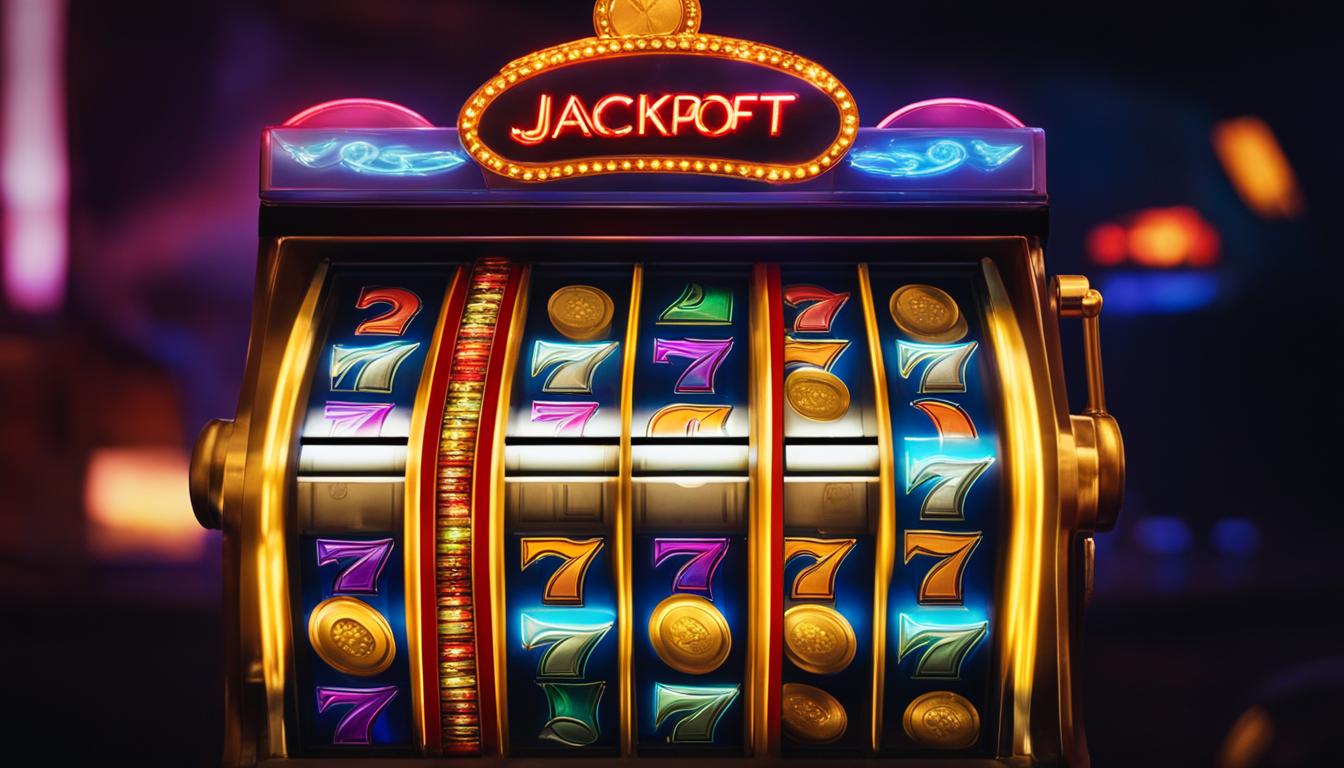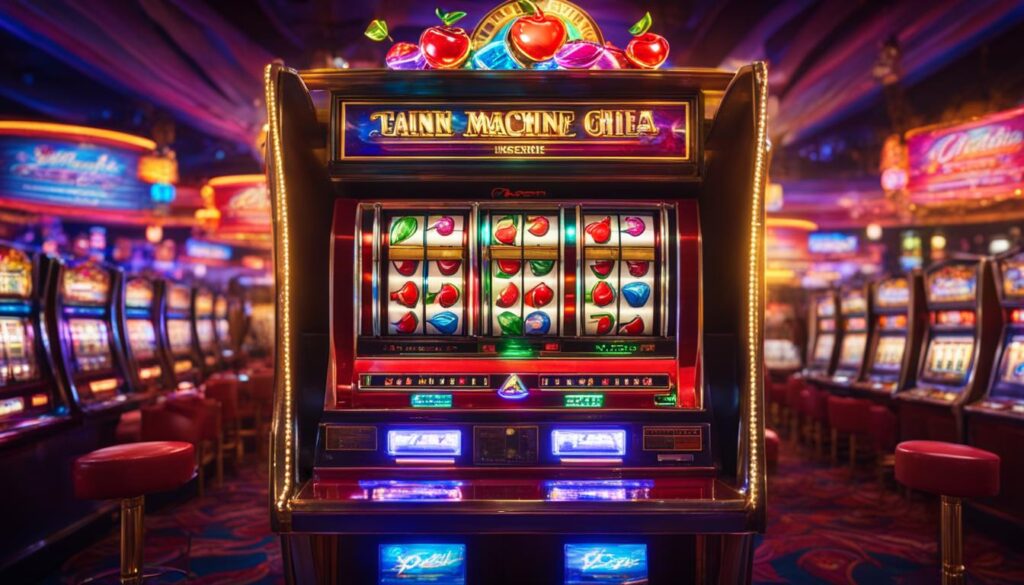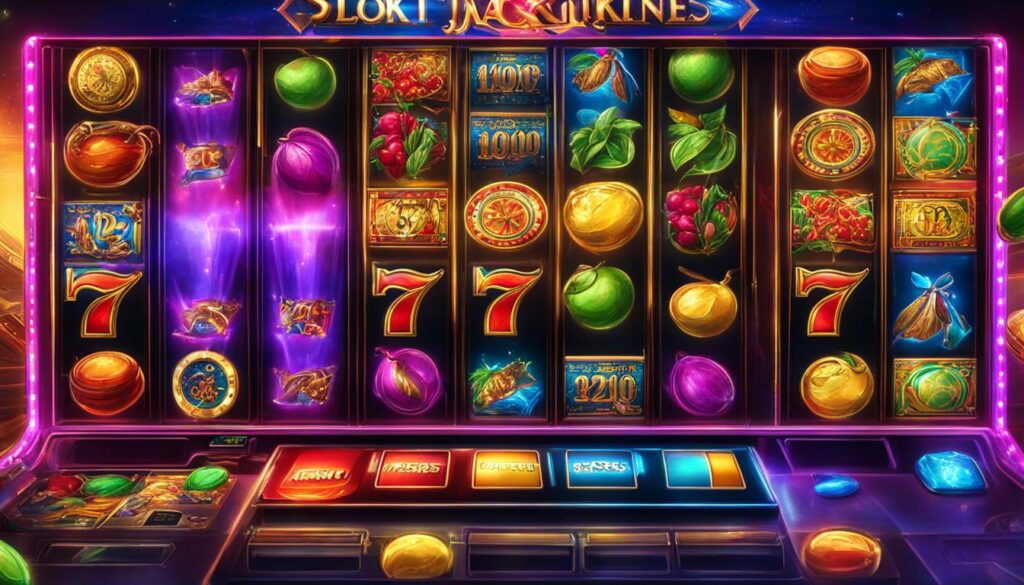Slot machines have been a staple in casinos worldwide for over a century, offering players the chance to win big on a spin of the reels. One question that lingers in the minds of many is how often do these machines actually hit the jackpot? Is it a rare occurrence or can players expect to win big more frequently than they think?
In this section, we will delve into the captivating world of slot machines and examine the frequency at which these machines payout jackpots, providing insights into the patterns and rates at which players can potentially hit that big win.
Key Takeaways
- Understanding the frequency of hitting the jackpot on a slot machine is crucial for players seeking to maximize their chances of winning big.
- Various factors, including the number of reels, symbols, and paylines, influence the probability of hitting the jackpot on a slot machine.
- The payback percentages of slot machines provide insights into how frequently they pay out jackpots and overall payout frequency.
- Mathematical formulas and calculations can be used to determine the probability of hitting the jackpot on a slot machine.
- While hitting the jackpot remains a rare occurrence, an understanding of the factors involved can increase players’ chances of winning big.
Understanding the Odds: Chances of Winning the Jackpot on a Slot Machine
If you’re an avid slot machine player, you’ve probably wondered about your chances of hitting the jackpot at some point. While the odds may seem daunting, it’s important to understand that each machine operates on a set algorithm that determines the likelihood of a big win.
The winning frequency of slot machines is determined by the game’s return-to-player (RTP) percentage. This percentage represents the long-term expected payback of the game, and typically ranges from 75% to 99%. The higher the RTP, the better your chances of winning. However, it’s important to note that this percentage is calculated over the machine’s lifetime, and not just for your individual session.
The odds of hitting the jackpot on a slot machine vary depending on the game’s design. Machines with higher jackpots often have lower hit frequencies, meaning that while the potential payout is greater, the chances of winning are lower. Conversely, machines with smaller jackpots may hit more frequently, but will have a lower maximum payout.
| Jackpot Size | Hit Frequency |
|---|---|
| Small | High |
| Large | Low |
Another factor that impacts your chances of winning the jackpot is the number of paylines on the machine. Machines with more paylines offer more opportunities to hit a winning combination, but the odds of hitting the jackpot remain the same.
Ultimately, the chances of winning the jackpot on a slot machine come down to luck. However, understanding the odds and the machine’s design can help you make more informed decisions and potentially increase your chances of winning.
Decoding the Jackpot Hit Rate: Frequency of Hitting the Big Win on a Slot Machine
There is no denying the thrill of hitting the jackpot on a slot machine. But how often can players expect to hit that big win? Let’s take a closer look at the frequency of hitting the big win on a slot machine, also known as the jackpot hit rate of slot machines.
The jackpot hit rate varies widely between different types of slot machines and even between individual machines within the same type. However, one thing is certain – the probability of hitting the jackpot on a slot machine is very low. In fact, the odds are often in the millions to one.
One factor that influences the jackpot hit rate is the number of symbols on the slot machine’s reels. Machines with more symbols generally have a lower hit rate, and vice versa. Additionally, machines with higher denominations usually have higher hit rates, as they tend to have a higher payout percentage overall.
To give you an idea of the frequency of hitting the jackpot, let’s take a look at some real-world examples. In a study of Las Vegas Strip casinos, it was found that slot machines with a $100 denomination had a hit rate of 24.17%, while machines with a $1 denomination had a hit rate of just 5.01%. Similarly, a study of Atlantic City casinos found that machines with a $25 denomination had a hit rate of 14.32%, while machines with a $0.05 denomination had a hit rate of 2.73%.
Of course, these hit rates are just averages and individual machines can vary widely. Some machines may go weeks or even months without hitting the jackpot, while others may hit it twice in a day. It all comes down to luck and chance.
“The probability of hitting the jackpot on a slot machine is very low. In fact, the odds are often in the millions to one.”
Ultimately, understanding the jackpot hit rate of slot machines can help players manage their expectations and make informed decisions about which machines to play. Machines with higher denominations and payout percentages generally have higher hit rates, but there is still an element of luck involved. As with any form of gambling, it’s important to gamble responsibly and only wager what you can afford to lose.
Demystifying the Probability: Calculating the Likelihood of Hitting the Jackpot
Calculating the probability of hitting the jackpot on a slot machine can be quite complex, requiring an understanding of mathematical concepts and statistical analysis. However, there are some basic formulas and principles that can help players gain a better understanding of the likelihood of winning big.
The most important factor in determining the probability of hitting the jackpot is the number of symbols on each reel. For example, if a slot machine has three reels and each reel has 20 symbols, the total number of possible combinations is 20 x 20 x 20 = 8,000. This means that the odds of hitting the jackpot on that particular machine are 1 in 8,000.
It’s important to note that not all symbols on a slot machine have an equal chance of appearing on each reel. Some symbols may appear more frequently than others, making it more likely that they will be part of a winning combination. To calculate the probability of hitting the jackpot, players must take into account the frequency of each symbol and factor it into the overall equation.
Another crucial factor to consider when calculating the probability of hitting the jackpot is the payout percentage of the machine. This percentage represents the amount of money that the machine pays out compared to the amount of money that is wagered over a certain period of time. The higher the payout percentage, the more likely it is that players will hit the jackpot.
Players can use a simple formula to calculate the probability of hitting the jackpot on a slot machine:
Probability of Hitting the Jackpot = (Number of Winning Combinations) / (Total Number of Combinations)
By plugging in the appropriate numbers for each variable, players can determine the probability of hitting the jackpot on a particular machine.
It’s important to keep in mind that the probability of hitting the jackpot on a slot machine is always the same for every spin. Each spin is an independent event, meaning that the outcome of one spin has no effect on the outcome of the next spin. Just because a machine hasn’t paid out in a while doesn’t mean that it’s due for a win.
Overall, understanding the probability of hitting the jackpot on a slot machine can help players make informed decisions about their wagers and increase their chances of winning big.
Analyzing the Payback: How Frequently Do Slot Machines Pay Out Jackpots?
When it comes to slot machines, one of the biggest questions players have is “how frequently do they pay out jackpots?” The answer, of course, depends on a variety of factors, including the specific game being played and the overall payout percentage of the machine.
According to industry data, most slot machines have an average payout percentage of around 96%. This means that, over time, the machine will pay out $96 in winnings for every $100 wagered. However, it’s important to note that this payout percentage is calculated over the long-term and doesn’t necessarily reflect the frequency of jackpot payouts.
To gain a better understanding of how often jackpot payouts occur, it’s helpful to examine the payback percentages of individual games. For example, some slot machines may have a higher payout percentage but a lower frequency of jackpot payouts, while others may have a lower payout percentage but a higher frequency of jackpot payouts.
One study conducted by Michael Shackleford of the Wizard of Odds found that the frequency of jackpot payouts varies widely between different slot machines. In his analysis, he found that some machines paid out jackpots as rarely as once every 10,000 spins, while others paid out jackpots as frequently as once every 200 spins.
The table below shows the jackpot frequencies of several popular slot machines:
| Slot Machine | Jackpot Frequency |
|---|---|
| Wheel of Fortune | ~1 in 10,000 spins |
| Mega Moolah | ~1 in 5 million spins |
| Lightning Link | ~1 in 200 spins |
| Buffalo | ~1 in 1,000 spins |
However, it’s important to note that these frequencies are only rough estimates and can vary widely based on a player’s individual luck and the specific machine being played.
Overall, while it’s difficult to say exactly how frequently slot machines pay out jackpots, a player’s best bet is to choose a machine with a high payout percentage and a frequency of jackpot payouts that suits their playing style.
Conclusion
After exploring the fascinating world of slot machines, we now have a better understanding of how often they hit the jackpot and the factors that influence our chances of winning big.
Keep in Mind
It’s important to remember that hitting the jackpot on a slot machine is a game of chance. While understanding the odds and payout frequency can potentially increase our chances of winning, there is no guaranteed strategy for hitting the big win.
Have Fun
Whether you’re a seasoned gambler or a newbie, playing slot machines should always be about having fun. Set a budget, stick to it, and enjoy the thrill of the game.
So go ahead, give those reels a spin, and who knows – you could be the lucky one to hit the jackpot!
FAQ
How often do slot machines hit the jackpot?
The frequency at which slot machines hit the jackpot can vary depending on various factors, including the specific game, its volatility, and the random number generator (RNG) algorithm used. However, it is important to note that hitting the jackpot is still a relatively rare occurrence and not something that happens frequently.
What are the chances of winning the jackpot on a slot machine?
The odds of hitting the jackpot on a slot machine are typically quite low. It’s important to remember that slot machines are designed to be entertaining and provide a thrilling gaming experience, but they are not typically considered a reliable way to make money. The chances of winning the jackpot are usually determined by the game’s paytable and the number of possible winning combinations.
How frequently do slot machines payout jackpots?
Slot machines have different payout frequencies, depending on the game and its design. Some machines may offer jackpots more frequently, while others may have larger jackpots but hit them less often. It’s essential to understand that slot machines operate based on RNG algorithms, ensuring each spin is independent and random, making it challenging to predict when a jackpot will be paid out.
How is the probability of hitting the jackpot on a slot machine calculated?
The probability of hitting the jackpot on a slot machine is calculated using complex mathematical formulas and algorithms. These calculations take into account the number of symbols on the reels, their distribution, and the specific rules of the game. The resulting probability represents the likelihood of hitting the jackpot on any given spin.
How frequently do slot machines pay out jackpots overall?
The overall frequency at which slot machines pay out jackpots depends on the game’s payback percentage. The payback percentage refers to the portion of money that is returned to players over time. While some games may have a higher payback percentage, it’s essential to remember that slot machines are still designed to be profitable for the casino in the long run.


